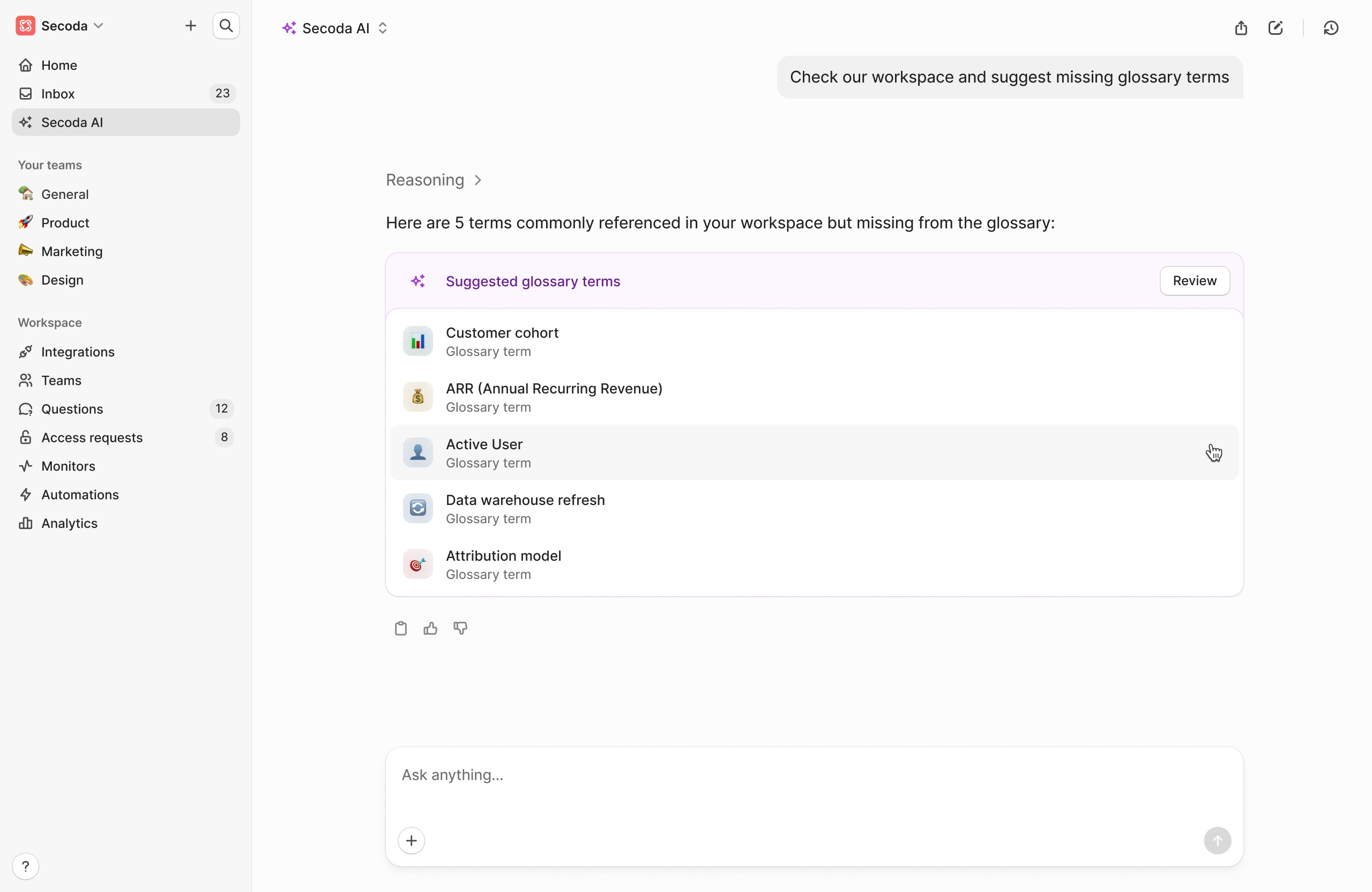Meet your AI-powered data agent to discover, document, govern, and analyze your data faster than ever before.



Unlike simple LLM wrappers, Secoda is built with RAG and metadata-trained embeddings to deliver secure, accurate, context-aware answers from your data stack at scale.
Go beyond static dashboards and unlock insights with natural language. Secoda AI turns data into action by removing the friction between questions and answers.
Instead of waiting on dashboards or data teams, anyone can explore insights directly and confidently. This means moving from question to insight with fewer bottlenecks.
Automate the repetitive grunt work with Secoda AI and unlock more time for high-value analysis. Routine requests answer themselves so your data team doesn’t have to.
Secoda AI results are governed by clear policies, giving teams confidence in every answer. Teams spend less time second-guessing data and more time driving impact.


“We’re training the company to rely on dashboards for basic things. But for anything more sophisticated, use Secoda AI”
Jesu Joseph
Global Head of Data and Advanced Analytics

From debugging a SQL error, documenting a new source, or tracing upstream dependencies, Secoda AI explains, respects permissions, and links back to source.
Customize AI personas and instructions for different roles and departments. From technical teams to business users, everyone gets contextual responses tailored to their needs.
Secoda AI connects to Slack and Teams, allowing people to interact with Secoda’s features without leaving their chat environment.
Automatically mask PII in resource queries before Secoda AI processing, and control SQL query access via integration-level permissions.













Secoda AI is built on a foundation of enterprise-grade security including SOC 2 compliance, encryption in transit, and comprehensive audit trails to ensure your data remains protected and compliant.

No, your data is never used to train AI models. This is one of Secoda's core security commitments, backed by multiple layers of protection. By default, only metadata is sent to Secoda AI. This includes resource names, descriptions, documentation, ownership information and tags, popularity metrics and usage statistics, and schema information and relationships.

Yes. Administrators can set up governance filters to specify exactly which resources AI can access through inclusive or exclusive filter rules. You can also disable specific AI tools like SQL execution on a workspace level.

Advanced Memory allows Secoda AI to learn from past successful interactions within your workspace to improve response quality. This learning remains within workspace boundaries, analyzes interaction patterns to identify successful strategies, builds workspace-specific knowledge tailored to your data pattern, and can be managed, controlled, or disabled by administrators.

Unlike some AI services that may use interactions to improve their models, Secoda's approach ensures your conversations remain private and are not used for training, your data patterns don't influence the base AI models, your business context stays within your organization, and your competitive information remains confidential.

Some data analysis use cases for Secoda AI include:
Faster analysis with natural language : Ask plain-English questions like “What’s the churn rate for Q4?” and get guided to the right tables, queries, or dashboards.
Smart query assistance: Speeds up query building, especially when navigating complex schemas or joining unfamiliar tables.
Faster time to value: Analysts can respond to ad-hoc stakeholder questions faster, with fewer clarifying back-and-forths. If stakeholders have access, they can even self-serve on common data questions using AI.
Meet your AI-powered data co-pilot to discover, document, govern, and analyze your data faster than ever before.

